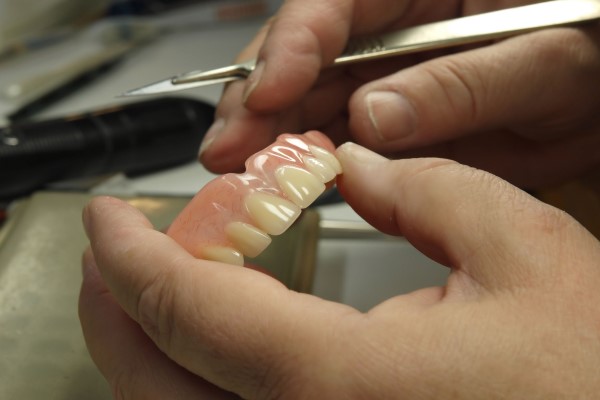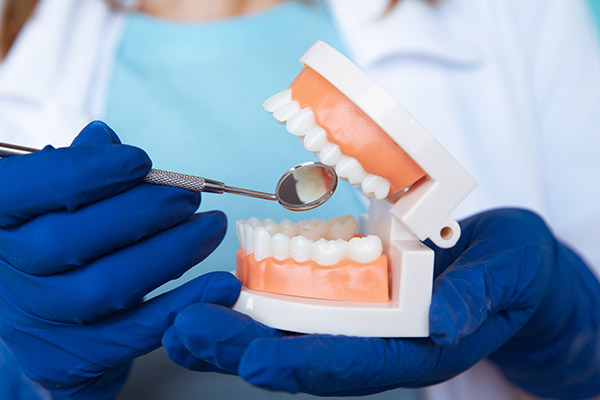General Dentistry: What Is a Denture Reline?

If you are a denture wearer, you know how much of an impact they can have on your life. From improved speech and nutrition to better appearance, it is no wonder why so many people may panic when a pair of dentures begin feeling uncomfortable. Dentures do not last forever, though. Over time, dentures wear down and you may notice the fit becoming loose. Other factors that may result in a poor denture fit may include changes in the jaw structure, periodontal disease or other trauma. When the fit becomes too poor, it may be time to contact a dentist about relining dentures.
Denture reline
Relining dentures is a process that adds material to part of the denture to improve the fit. It can also replace or repair parts of the dentures that may be causing a poor fit. Relining dentures is often performed in a dentist’s office as long as the adjustment is small. However, if a larger adjustment is needed, a dentist may have to take impressions of a patient’s mouth and send the dentures and impressions to a laboratory for the relining work. If this happens, the patient may be without dentures for a few days. When a dentist decides to reline a pair of dentures, there are four different types they may choose from, including temporary and permanent relines.
Temporary reline
There are two types of temporary relines, including temporary rigid and temporary soft reline. A temporary rigid reline is a semi-soft and resilient reline. It is often used as a temporary fix inside dentures and helps improve the overall shape and fit of the dentures. A temporary soft reline acts more like a bandage than anything else. It is used to help fit dentures the same day a patient undergoes an extraction. Because it is made from a softer material, it is flimsier and often only lasts a couple of weeks.
Permanent reline
Like temporary relines, there are two types of permanent relines. The first is a permanent rigid reline that is often used to update old dentures. As a wearer ages, their gums may shrink and change shape, causing dentures to become loose. If there is no damage to the dentures, a dentist can use hard plastic material to reshape part of the dentures without the need for a full replacement. A permanent soft reline involves using soft material on part of a permanent denture to help provide a cushion for irritated or thin gums. Because the material in a soft reline is softer, it has a shorter life span.
Get your dentures relined today
If you wear dentures and notice they are beginning to fit uncomfortably or becoming lose, you may benefit from a denture reline. Fortunately, there are a few different types of relines to choose from. The choice will depend on your oral health and the condition of your dentures. If you think a reline is for you, consult with a dentist to determine what kind of reline is right for you.
Request an appointment here: https://www.kingdentistry.com or call King Dentistry at (209) 585-1474 for an appointment in our Turlock office.
Check out what others are saying about our dental services on Yelp: Denture in Turlock, CA.
Recent Posts
Your restorative dentist can present treatments that can fix your dental issues. You can have a new smile after your appointment. Some dental problems may need more than one visit. Knowing when to see a restorative dentist can help you get the right procedure to bring back your smile and dental health.A restorative dentist can…
A restorative dentist can complete your smile by replacing your missing teeth. This can bring back your oral health and self-esteem. Knowing what teeth replacement method will suit you can help prepare you for your appointment. Here are the details on how seeing your restorative dentist can replace your lost teeth.These removable dental replacements are…
Your restorative dentist can offer different treatment modalities for your damaged teeth. There are different degrees of dental damage. A thorough assessment can help the dentist determine which can help you the most. Here are the details on what a restorative dentist can use to treat your damaged teeth.Tooth decay can cause cavities, and these…
Are you looking for a restorative dentist for your dental needs? Knowing where to start when beginning this search can be difficult, though you can utilize many resources. That said, you will need to consider a few factors when looking for the right dentist. Continue reading to learn more!Here are a few helpful tips for…


